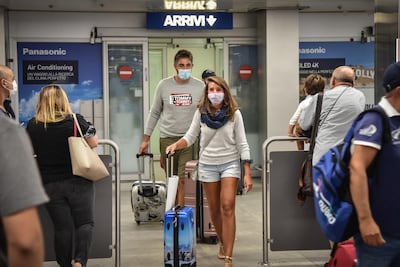European governments are rushing to clamp down on public life again amid concerns that summer revelry has reignited the spread of the coronavirus and brought on a second wave of severe outbreaks.
The World Health Organisation has warned the spread of the virus is increasingly being driven by people in their 20s, 30s and 40s who are less likely to show symptoms and unwittingly pass the disease on to others.
Tourists are also carrying Covid-19 across the continent and health officials are caught between the need to shore up ailing economies and the threat of contagion.
Europe’s oncoming second wave of the virus appears different in character to the first months of the pandemic, driven by club-going young adults and returning holidaymakers.
Countries such as Spain, Italy, France and Britain all suffered as the virus found its way into care homes and hospitals, infecting some of Europe’s most vulnerable people and contributing to the high death tolls seen almost without exception.
But with rules remaining in place to protect Europe’s elderly, the return of the virus is less likely to put the same burden on health services.
Instead, the challenge for European governments is to manage the spread of the virus across borders and to enable less-vulnerable younger people to return to work to continue rebuilding the continent’s shattered economies.
Cases rising as hotspots re-emerge
Steep rises in the number of new cases reported daily in Spain and Italy – which both rank among the worst-hit countries in Europe – have led to the closure of discos in an effort to suppress outbreaks blamed largely on young people out socialising.
“We cannot waste the sacrifices made in the past months,” Italian Health Minister Roberto Speranza said in a Facebook post. His government has also made mask-wearing compulsory from 6pm to 6am in public venues and in outdoor spaces, including squares and streets, where crowds can gather.
From the beaches of Ibiza to the crowded urban nightspots of Madrid, some 25,000 discos and nightclubs in Spain have been asked to suspend their operations as part of a package of 11 measures to curb the fastest virus growth rate among Europe’s major economies.
Spain’s health ministry blamed night-time socialising for a spate of new outbreaks, punching a hole in the government’s seven-week experiment to restore the country’s tourism industry, which is worth an estimated $175 billion (Dh642.77bn) annually.

“This will devastate us,” said Antonio Gomez of the SpainTOP travel agency in Madrid. “People don’t travel to Spain any more just for sun and beaches.”
In Greece, which threw open its doors to tourists early after appearing to endure the pandemic’s darkest months with relative ease, bars and restaurants have had their opening hours restricted to counter a rise in infections.
Greece reported 150 new Covid-19 cases on Monday, bringing the total to 7,222. Nearly 40 per cent of those have come in August.
The government is requiring bars and restaurants to close between midnight and 7am in the greater Athens region. It has also restricted the number of people allowed to gather for social events such as weddings to 50. The authorities are preparing guidance to help people safely return to work from holidays.
In France an increase of new cases over the past week has prompted the closure of some public areas such as beaches to prevent parties, with nightclubs closed since mid-March. A ban on gatherings of more than 5,000 people was extended until the end of October.
With European governments again curbing the social activities of young people the WHO continues to stress that nobody is invincible to the virus.
"We are seeing young people who are ending up in ICU. Young people are dying from this virus," WHO epidemiologist Maria van Kerkhove said on Tuesday, referring to intensive care units.
More than 21.9 million cases of the coronavirus have been recorded around the world and 774,769 people have died, according to data from Johns Hopkins University.
_______________















